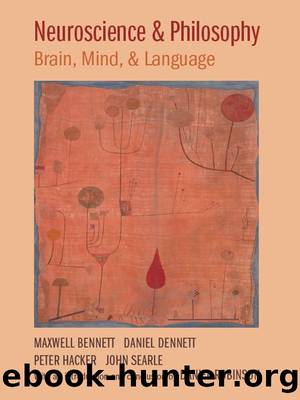Neuroscience and Philosophy: Brain, Mind, and Language by Maxwell Bennett & Daniel Dennett & Peter Hacker & John Searle

Author:Maxwell Bennett & Daniel Dennett & Peter Hacker & John Searle [Bennett, Maxwell]
Language: eng
Format: mobi
Tags: Philosophy/General
Publisher: Columbia University Press
Published: 2006-12-31T16:00:00+00:00
Metaphorical and Literal, Observer-Relative and Observer-Independent Attributions of Psychological States
Third, neurons as subjects and agents. A third form of attribution that Bennett and Hacker object to is when subcerebral parts of the brain are attributed psychological processes. Thus, for example, they quote Blakemore as saying that neurons perceive, neurons decide, neurons make inferences, etc. They think that this is also an instance of the mereological fallacy.
I take it that, properly understood, this is, or at least can be, a harmless metaphor. Indeed, in the scientific literature people make these sorts of attributions to the stomach. They say the stomach knows when certain sorts of chemicals are needed to digest certain sorts of carbohydrate inputs. As long as we keep clear the distinction between the literal observer-independent sense in which I infer or I receive information and the metaphorical and observer-relative senses where we say my neurons make such and such inferences or my neurons perceive such and such phenomena, it seems to me that these metaphors are, or at least can be, harmless. It is easier to make the mistake of confusing the real observer-independent senses with the observer-relative and metaphorical senses where the brain is concerned, than it is where other organs are concerned, for the obvious reason that intrinsic observer-independent psychological processes go on in the brain in a way that they do not go on in the stomach and the rest of the digestive tract. I am sure that Bennett and Hacker are right in thinking that at least some of the authors they criticize do not have a clear sense of the distinction between the observer-independent attributions of these phenomena and the observer-relative and metaphorical attributions of these phenomena. The worst culprit, semantically speaking, is the notion of “information.” An additional confusion is added by the engineers’ use of “information” in the “information-theoretical” sense, which has nothing to do with information in the sense in which I have information that such and such is the case. We are told, for example, that the brain does information processing. Well, in one sense, that is obviously true. I take in information perceptually and I think about it, and then I derive new information by making inferences. The problem is that there are all sorts of subpersonal processes going on in the brain, in the lateral geniculate nucleus, for example, which can be described as if they were cases of thinking about information, but of course there is literally no information there. There are just neuron firings, which result in information of a conscious kind at the end of the process but themselves have no semantic content. Bennett and Hacker are clear about the distinction between the information theoretic sense of “information” and the intentionalistic sense. They refer to these as the “engineering” sense and the “semantic” sense, but I do not find in their book a clear statement of the distinction between the observer-independent sense and the observer-dependent sense of “information.” I have observer-independent information about my phone number.
Download
This site does not store any files on its server. We only index and link to content provided by other sites. Please contact the content providers to delete copyright contents if any and email us, we'll remove relevant links or contents immediately.
Periodization Training for Sports by Tudor Bompa(7891)
Why We Sleep: Unlocking the Power of Sleep and Dreams by Matthew Walker(6307)
Paper Towns by Green John(4757)
The Immortal Life of Henrietta Lacks by Rebecca Skloot(4226)
The Sports Rules Book by Human Kinetics(4048)
Dynamic Alignment Through Imagery by Eric Franklin(3891)
ACSM's Complete Guide to Fitness & Health by ACSM(3792)
Kaplan MCAT Organic Chemistry Review: Created for MCAT 2015 (Kaplan Test Prep) by Kaplan(3776)
Introduction to Kinesiology by Shirl J. Hoffman(3605)
Livewired by David Eagleman(3515)
The River of Consciousness by Oliver Sacks(3385)
The Death of the Heart by Elizabeth Bowen(3314)
Alchemy and Alchemists by C. J. S. Thompson(3270)
Descartes' Error by Antonio Damasio(3141)
Bad Pharma by Ben Goldacre(3068)
The Gene: An Intimate History by Siddhartha Mukherjee(2898)
The Emperor of All Maladies: A Biography of Cancer by Siddhartha Mukherjee(2883)
The Fate of Rome: Climate, Disease, and the End of an Empire (The Princeton History of the Ancient World) by Kyle Harper(2841)
Kaplan MCAT Behavioral Sciences Review: Created for MCAT 2015 (Kaplan Test Prep) by Kaplan(2783)
